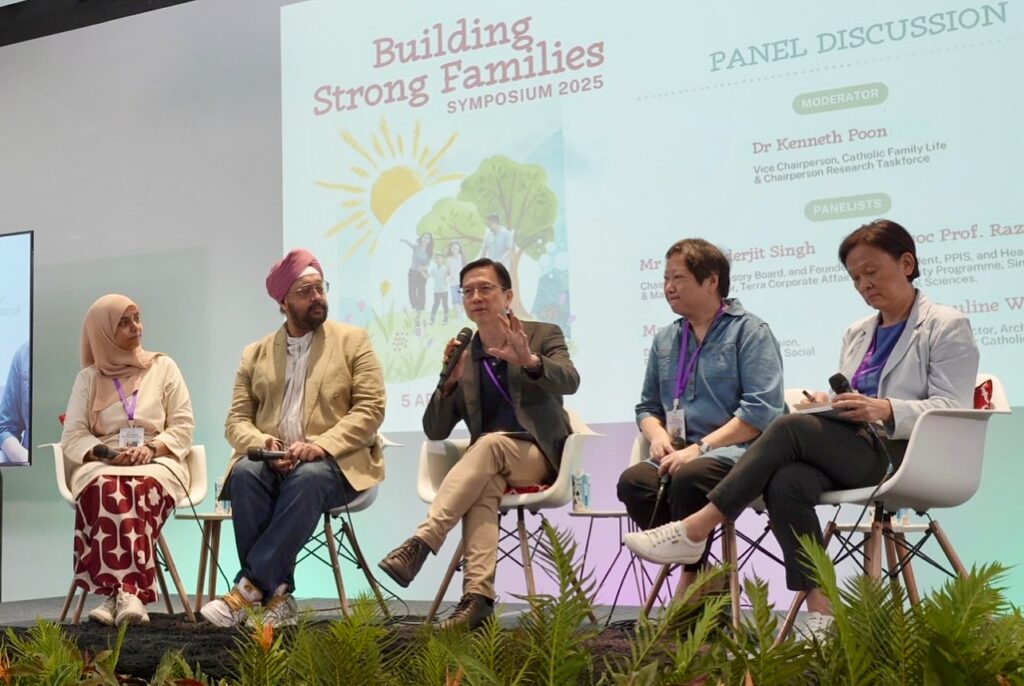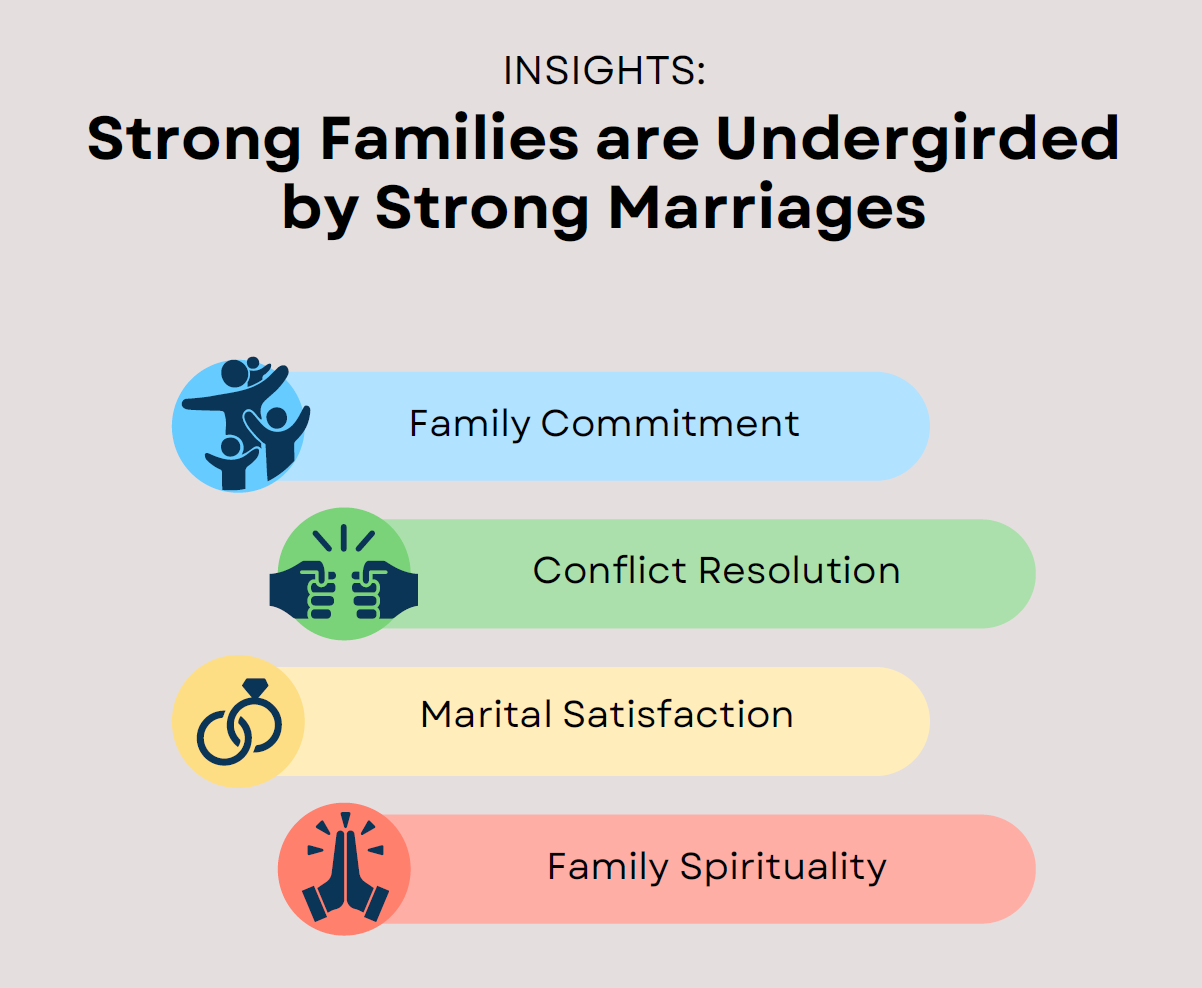What makes a strong family?
This was the question that Catholic Family Life investigated in its latest study, published in April 2024 and presented at its symposium in 2025.
Led by Dr Kenneth Poon, the study was done in three phases from 2022 to 2024. The first involved interviews with nearly 50 participants to identify key themes, and the second was a survey of 2,200 participants. The final phase involved focus group discussions with 23 individuals who were working with families, in order to ascertain the findings and develop strategies to help build stronger families.

Amidst the various factors that contribute to stronger families, the study interestingly found that grandparents and intergenerational relationships could be a “double-edged sword”. Why is that so?
Four factors that make a strong family
The study found that: Strong families are undergirded by strong marriages. Four factors are key: family commitment, conflict resolution, marital satisfaction and family spirituality.

Of all the four factors, family commitment was found to be the strongest predictor of family resilience. Such commitment was demonstrated, for example, when family members prioritised spending quality time together despite busy schedules or invested hard work to overcome challenges together.
Conflict resolution includes having respect for each other, avoiding blame and “not saying things we don’t mean” in times of conflict. An important factor was learning to address conflict without criticising each other, and being able to be “flexible” and “compromise” to “forgive and be forgiven”.
Marital satisfaction was seen to support these other factors. The study noted: “A secure, loving dyadic relationship in two-parent families marked by high quality communication between couples is found to provide a consistent, healthy environment for child social and cognitive development.”
The weakest predictor of family resilience, on the other hand, was family spirituality. The study found that this factor only tended to predict family resilience for those married for more than 20 years. Although most participants were referring to religious beliefs and practices, such spirituality also referred to things “beyond the embodied rituals, practices, values, and beliefs that point to a specific God, higher power, or belief system that religions often subscribe to”.
Role of grandparents in building strong families
Intergenerational contact was one of the aspects of family relationships, which the four factors can potentially strengthen or affect. Described as a situation where grandparents or in-laws look after their grandchildren, the study suggested that grandparents were a “double-edged sword” in strengthening families.
On one hand, some participants credited the caregiving role of grandparents in reducing parental stress.
For some families, intergenerational support in caregiving enabled families to have more capacity to take care of their children, build intergenerational connectedness, allow other members of the family to work and enjoy a better quality of life.
Grandparents were described to have “helped” their grandchildren and “took care of their needs” such as by “fetching them to school”, “cooking” etc.
Sometimes, the support stretches across four generations, as one interviewee reflected:
“The support that I had I would say is in the earliest my grandmother, stepping in to help me look after my children really helped me to focus on my work and earning money, so that I could afford to help my husband be educated in university and then, so after he started work, after we got our flat, we had a helper, and a few years later I felt I needed to spend more time with the kids and by that time, he was earning enough for me to stop work, that’s when I took the time off to be with the children.”
Intergenerational support in caregiving was also beneficial for marriages, by allowing parents to have more time for dates, as can be seen from this other interviewee’s remarks:
“Okay, we are, we are very fortunate that we have very strong family support. So my parents have always been there for us, my mother in law, my late mother in law have always been there for us so, right from day one of marriage, we always had couple of night one, date night so my, my parents, so kids, not only date night ah, we every year, we go on holiday as a couple together, without the kids, so parents will all come out and look after, come by and make sure they have enough to eat and all that…”
On the other hand, some said that the co-parenting of young children between parents and grandparents have led to conflict in families.
For example, one interviewee who worked with families observed that some clients “don’t like their children to be taken care by their in laws, or even their own parents due to difference in, you know, parenting values and all this.”
Important to have common values
How do we promote the positive aspects of grandparenting and intergenerational relationships, and avoid its pitfalls?
The study highlights the key importance of aligning “parenting values”, in order to “promote the protective role of grandparents as caregivers to their grandchildren”.
According to the findings, the source of the tension was “the breakdown in alignment in values and beliefs (i.e., parenting)”. Thus, the study stresses “the importance of having shared goals and values within the family unit, extending beyond the nuclear family (i.e., parent and children) to grandparents and relatives”, in order to build stronger families.
To translate these ideas into action, the authors suggest creating opportunities “to role model values in action to build stronger families across all aspects of family life”. This means allowing family members the opportunity to be intentional with their responses, their language, and their choices to reflect the common values upheld within their families.


